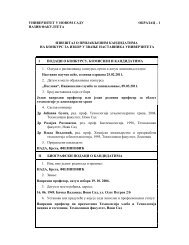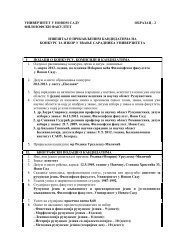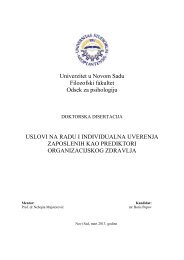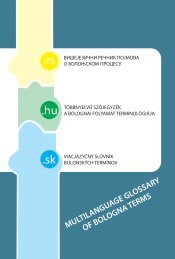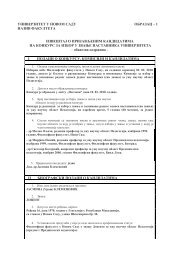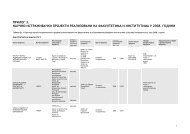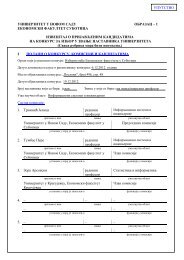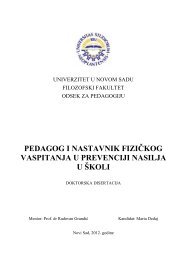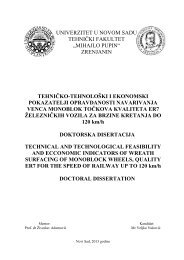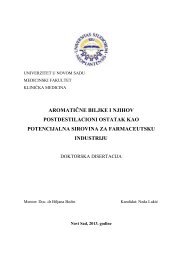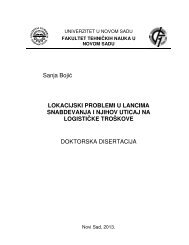Intercultural competence as an aspect of the communicative ...
Intercultural competence as an aspect of the communicative ...
Intercultural competence as an aspect of the communicative ...
You also want an ePaper? Increase the reach of your titles
YUMPU automatically turns print PDFs into web optimized ePapers that Google loves.
concept <strong>of</strong> ICC in <strong>the</strong> university setting may be a springboard for fur<strong>the</strong>r research b<strong>as</strong>ed<br />
on intercultural <strong>competence</strong> <strong>an</strong>d communication, <strong>an</strong>d help define fur<strong>the</strong>r <strong>an</strong>d more<br />
definite investigation. In order to achieve this, <strong>the</strong> approach employed w<strong>as</strong> a mixed<br />
methods approach (Teddlie, T<strong>as</strong>hakkori 2009), which presents ‘<strong>an</strong> integration <strong>of</strong><br />
statistical <strong>an</strong>d <strong>the</strong>matic data <strong>an</strong>alytic techniques, plus o<strong>the</strong>r strategies unique to mixed<br />
method (e.g. data conversion or tr<strong>an</strong>sformation)’ (Teddlie, T<strong>as</strong>hakkori 2009: 8). Such<br />
research c<strong>an</strong> address a number <strong>of</strong> questions which are exploratory in nature, might give<br />
stronger inferences, <strong>an</strong>d <strong>of</strong>fer a wider r<strong>an</strong>ge <strong>of</strong> views (Teddlie, T<strong>as</strong>hakkori 2009).<br />
The study tried to establish whe<strong>the</strong>r students knew how to identify possible<br />
troublesome are<strong>as</strong> (fixed points, Jensen 2006) through a culture <strong>as</strong>similator. A number <strong>of</strong><br />
critical incidents comprising <strong>the</strong> culture <strong>as</strong>similator were devised, specially focused on<br />
<strong>the</strong> Serbi<strong>an</strong> <strong>an</strong>d Anglophone cultures in contact. These might be used in cl<strong>as</strong>s to practice<br />
both l<strong>an</strong>guage <strong>an</strong>d intercultural <strong>competence</strong>. In that respect <strong>the</strong> study h<strong>as</strong> a concrete<br />
outcome – a teaching (<strong>an</strong>d potentially <strong>as</strong>sessment) tool, which c<strong>an</strong> be fur<strong>the</strong>r honed <strong>an</strong>d<br />
tested. Hopefully, this may help English l<strong>an</strong>guage teachers at a university <strong>an</strong>d even high<br />
school level in terms <strong>of</strong> including culture <strong>as</strong>similators into <strong>the</strong>ir teaching practices.<br />
Finally, <strong>the</strong> aim for <strong>the</strong> study w<strong>as</strong> not to provide <strong>an</strong>y a particular level <strong>of</strong> <strong>the</strong><br />
particip<strong>an</strong>ts’ ICC, <strong>as</strong> it w<strong>as</strong> focused on a ‘section’ <strong>of</strong> foreign l<strong>an</strong>guage learning. Ra<strong>the</strong>r, it<br />
might serve <strong>as</strong> a starting point for a wider study that would engage scholars from different<br />
fields <strong>of</strong> Serbi<strong>an</strong> l<strong>an</strong>guage, English l<strong>an</strong>guage, sociology, pedagogy, psychology in a joint<br />
venture to provide training in ICC.<br />
1.3. Signific<strong>an</strong>ce <strong>of</strong> <strong>the</strong> study<br />
There are several <strong>as</strong>pects that <strong>the</strong> study addressed, thus making it signific<strong>an</strong>t both<br />
for <strong>the</strong> underst<strong>an</strong>ding <strong>of</strong> ICC in <strong>the</strong> Serbi<strong>an</strong> context <strong>an</strong>d <strong>the</strong> applied linguistics, especially<br />
for <strong>the</strong> current TEFL practices at <strong>the</strong> tertiary level. While this is fur<strong>the</strong>r commented on in<br />
<strong>the</strong> concluding chapter, only several signific<strong>an</strong>t <strong>as</strong>pects are presented here.<br />
Firstly, <strong>the</strong> field <strong>of</strong> ICC is relatively new, despite its having been developed over<br />
<strong>the</strong> course <strong>of</strong> 60 to 70 years, <strong>the</strong>re have not been m<strong>an</strong>y studies conducted to explore <strong>the</strong>se<br />
particular issues in Serbia. While <strong>the</strong>re were studies that were concerned with <strong>the</strong><br />
students’ views on EFL or explored students’ stereotypes about a FL culture <strong>the</strong>re have<br />
not been studies aimed solely at students’ ICC.<br />
Secondly, culture does not play a signific<strong>an</strong>t part in ELT, <strong>an</strong>d <strong>the</strong> same goes for<br />
IC elements. The research conducted so far (Kramsch 2003, Lambert 1999, Sercu 2005)<br />
8



